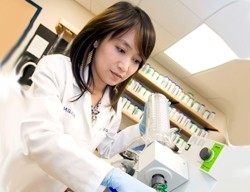
Name
Vivian Wu, Ph.D.
Title
Associate Professor, Department of Food Science and Human Nutrition
Institution
University of Maine
Education
B.S., Life Science, National Chung-Hsing University, Taiwan; M.S., Food Science, Kansas State University; Ph.D., Food Science, Kansas State University
What brought you to University of Maine?
Ten years ago I was a recent graduate of Kansas State University and was looking for a job in the field of food science. A food science position opened up at the University of Maine. I interviewed for an extension position and was offered with a new research/teaching faculty position.
How did you learn about the Center for Produce Safety?
I have been on their email distribution list for quite some time. I was interested in staying abreast of their funding opportunities. Many of my colleagues and collaborators informed me about CPS and their role in food safety research.
Why did you apply for funding from CPS?
One my projects correlated with the RFP last year so I decided to apply for funding. Produce safety has always been one of the focus points in my research, but with this project I decided to focus more on pre-harvest issues. It was wonderful to receive the funding.
In 2013 CPS funded your project, “Evaluation of the level of white-tailed deer fecal colonization by E. coli O157:H7 and the ecological role of the dung beetles with the pathogen in produce farms.” Are there any updates?
The funding for this project came through this year and we are currently still doing research. My two main objectives are 1) Determining and recognizing the colonization of E. coli O157:H7 in deer fecal samples and 2) Determining whether dung beetles contribute to the transference of E. coli O157:H7 or reduce the transference of E. coli O157:H7 from the feces to the fruit. We have found that the amount of E. coli O157:H7 found in the deer fecal samples is lower than we expected. Also, we found that the blueberries were not contaminated directly from the dung beetles. By the completion of this project I hope to have a better understanding of the role of the dung beetle: Is it a vector to transfer the O157:H7 strain of E. coli or is it a barrier?
What do you think the industry will gain from your research project?
I hope this project provides information that will enhance produce food safety knowledge. I hope this project generates useful information for pre-harvest farming and what the role is of the dung beetle. Perhaps the dung beetle has the potential to be a biological control.
Where do you see the field of food safety research 5 years down the road? Why?
I suspect that preventative controls, including effective intervention technologies, will be major factors in the field of food safety research. I feel that effectively detecting microorganisms in order to make food products ever safer is on the horizon as well. A focus on research into protozoa can still be expanded and it would be beneficial if that area turned into a focus for researchers in the field of food safety. For example, Taxoplasma gondii is a protozoan parasite that could infects humans via fresh food consumption.
What are the key factors influencing this field of inquiry?
One key factor is that more and more people are focused on purchasing and consuming whole fresh fruits and vegetables. With this increase in demand, the produce industry needs to be ever more cautious in how perishable foods are handled and cared for from pre-harvest to post-harvest. Another key factor is the increased globalization of food products. The locations that produce is shipped are now so vast that it is difficult to stop and recall contaminated items once they have been distributed. I feel the Food Safety Modernization Act will bring a lot of attention to food safety.
Aside from working in the laboratory, how else do you spend your time?
I teach and supervise graduates and undergraduates. I am very active in national and international research collaborations. I have also taken on a role in promoting the fresh fruit industry of Maine (mainly blueberries) to China and Taiwan. This role requires that I travel to China often where I give talks describing the nutritional value of blueberries and cranberries. Most recently, I went with the Governor of Maine, Paul LePage, to promote Maine’s blueberry industry to China. When I am not at the University of Maine or traveling abroad, I spend time with my husband and my two year old son.
Describe one or more of your career highlights
I recently received the BIMBO Pan-American Nutrition, Food Science and Technology award for the biosensor research I lead. I received the Distinguished Service Award from the Chinese American Food Society (CAFS) for the service I have contributed to the society. I was honored by Shanghai Ocean University in China when they invited me to help establish a research program in food safety.